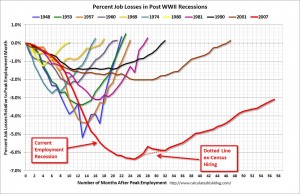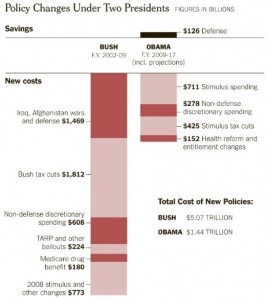Writing as an ‘outsider’ who deeply dislikes the thinking which gives rise to the apparent need for a word such as ‘outsider,’ it seemed cheekily appropriate to write about the first of the “Presidential Debates.” The full transcript can be found here:http://www.nytimes.com/2012/10/03/us/politics/transcript-of-the-first-presidential-debate-in-denver.html?pagewanted=all&_r=0
The first presidential ‘debate’ was, I’m sorry, farcical. That is not hyperbole. The first three ‘segments’ – supposedly concentrating on the economy, were near replicas of each other. Mr Lehrer, who had apparently chosen the questions himself, and had phrased them so ambiguously that they could easily be taken for the same question: in fact, by and large this is how they were fielded, by both candidates. These are they as an aid to memory:
1: “What are the major differences between the two of you about how you would go about creating new jobs?”
2: “What are the differences between the two of you as to how you would go about tackling the deficit problem in this country?”
3: “It’s two minutes. Mr. President, do you see a major difference between the two of you on Social Security?”
4: “You want the Affordable Care Act repealed. Why?”
5: “Do you believe — both of you — but you have the first two minutes on this, Mr. President — do you believe there’s a fundamental difference between the two of you as to how you view the mission of the federal government?”
6: Many of the legislative functions of the federal government right now are in a state of paralysis as a result of partisan gridlock. If elected in your case, if re-elected in your case, what would you do about that?”
(The sixth question was only asked three minutes before the debate’s end, which gave neither candidate time to produce anything but a synoptic answer with no subsequent discussion. Which is a pity, because in many ways it’s the most interesting question. The moderator was ever verging dangerously close to incompetency, and doing so immoderately.)
The first five questions elicited variations on almost the same answers from the candidates: Obama would finish the work of the last four years, Romney would “look at history” and do something “not like anything that’s been tried before. Both espoused support for the “middle class,” who both acknowledged were “suffering.” This was interesting, as I have never yet seen any coherent definition of exactly who the “middle class” are, and when people start talking about things which have no clear definition one ought to wonder why they use these terms. In Europe, from where I am writing, these terms have clear historical meanings: the “middle class” are those who are neither “the aristocracy” nor “the working class.” So, with a little substitution one could conclude that the “middle class” are those who are below the moneyed elites, and above the working class (and, presumably, by dint of tainted status, those unemployed or who have stopped seeking employment). But it’s the working class, surely, who do the work; it’s the working class for whom these jobs are most important.
Now, in Britain the old distinction between classes had been pretty consistent for at least two hundred years. Then, in 1979, an interesting shift began, instigated under the governance of Margaret Thatcher’s Conservative Party and, I suspect, set in motion quite calculatedly by Thatcher herself. The shift was a redefinition of “working class” and “middle class,” such that the “middle class” were characterized as having the socio-economic benefits to which the “working class” aspired, or ought to aspire. The “middle class” then had its numbers swollen even more by the inplicit inclusion of the “aspirational working class.” Thus the “middle class” has ended up – in the UK – as the vast maority of people, irrespective of actual income or actual status. You are middle class if you are not of the “landed gentry” and not “on the dole.” The membership has become so vast that the category no longer has any basis in reality, its only basis being rhetorical. A little like the “tax payer,” darling term of our media. Both the “tax payer” and the “member of the middle class” have become almost mythological creations of the media/military/legislative/industrial complex. And people here have almost entirely forgotten about this shift in meaning: both the Labour Party and the Conservatives claim to be the party of “the middle class.”
So both candidates were reaching out to the same sector of the population. And, I’m sad to say, Mr Romney did this with greater surety, aplomb and seeming conviction than did Mr Obama. This is not to say that his arguments were more cogent; these “positive” qualities were purely presentational. His was a ‘seductive’ appeal rather than an appeal to reason. In fact what he said so seductively was by and large unreasonable, untested and dangerous in the extreme; far more dangerous than Mr Obama’s utterances (though they, too, contained dangerous motifs). Romney sounded assured, certain, about the capacity of his plan – never spelled out in detail – which had never been tried before.
The people have been taught to admire strength, or what they are told is strength, forthrightness, or what they are taught is forthrightness, and charisma – which cannot be taught. They have been taught to prefer eyes that look straight at the person spoken to than those which remain lowered in order to concentrate on notes. And what the people have been taught to admire, they tend to vote for. And in this particular case, voting for Romney would be a disaster, both for America and for the rest of the world (which many Americans have forgotten, it seems, is much, much larger than America is or ever could be). To be fair, Mr Obama presides over a highly toxic administration which has openly arrogated to itself the powers of “world police,” moral arbiter, judge, jury and executioner, and he needs to be dealt with. Mr Romney’s election would destabilize even that which is already unstable. Here’s what he would do with his five part plan:
“One, get us energy independent, North American energy independent. That creates about four million jobs.
Number two, open up more trade, particularly in Latin America; crack down on China if and when they cheat.
Number three, make sure our people have the skills they need to succeed and the best schools in the world.
Number four, get us to a balanced budget.
Number five, champion small business.”
I dearly hope that these are in no particular order. Number one alone poses a real and present danger to all seven billion inhabitants of this planet, in the form Romney sketches it out. Creating four million jobs a the possible cost of the species seems like an unsound gamble. Number two sounds both isolationist and imperialist, isolating the Americas and likely to be achieved at least in part by military or covert interventions. What “cracking down on China if and when they cheat” precisely means is unclear, but it does not sound like a safe attitude to one’s main creditor and business partner. Number three, as I’m sure any Printculture reader knows, is hardly likely to happen given Mr Romney’s attested views on what we here still take pride in calling the welfare state. Number four is to be achieved through completely untested means, by Mr Romney’s own admission. Number five, well, Mr Romney’s view appears to be that “small business” is primarily an adjunct to the functioning of large corporations such that, if large corporations grow, so too the number of small businesses.
Oh, yes. Mr Romney will absolutely not be making any cuts in military spending. One wonders – why? – and is fearful of the answer.
Here are a few suggestions for Mr Obama, none of which he articulated plainly. In particular order only with regard to the first point.
1: The threat of anthropogenic climate change is the single most important threat to everyone, everywhere, everywhen. Period.
2: In any civilization worthy of the name, healthcare is a basic human right, irrespective of the wealth of the recipient. Period.
3: Any destabilizing, resource-centered foreign policy, even one less biased that the one he currently presides over, is counterproductive to (1) as well as being inherently hazardous. Period.
4: As for healthcare, so too for education. So too for shelter. So too for food. Period.
5: Likewise for every and all public infrastructure. Competition in infrastructures which have universal benefit and usage must always be counterproductive due to systems incompatibilities and loss of economies of scale. Period.
6: Money has no place influencing politics in anything even remotely close to the degree to which it is permitted to in the U.S.A..
I also hope that Mr Obama wins this intrinsically rigged election, as he seems to be more likely to be convinced by the above, and I, for one, very much hope that the deliberately repeated ‘periods’ do not coalesce into a full stop.





